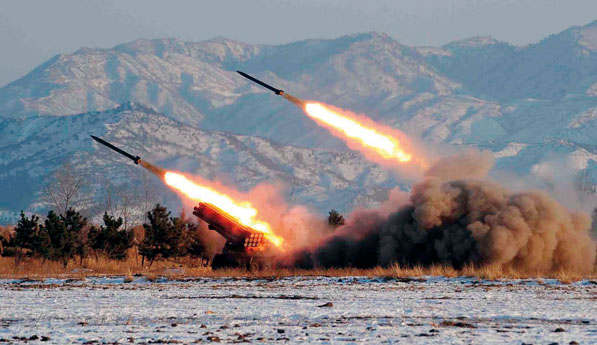Burma’s Missile Dream

Naypyidaw appears to be intent on setting up a missile defense sytem to deter po tential enemies
Is Snr-Gen Than Shwe delusional? Subordinates of Burma’s paramount leader are said to have repeatedly heard him say how much he admires North Korea’s use of missile technology to bully and defy its neighbors and the West. The bad news is that Than Shwe’s hard-line military leaders and ministers may agree with him.
However, Burmese opposition groups in exile suspect that army officers who disagree with Than Shwe’s policy deliberately leaked secret documents to exiled media groups, including The Irrawaddy. These documents throw light on Burma’s military ties with Pyongyang.
One leaked document detailed Gen Shwe Mann’s secret visit to Pyongyang in November 2008. Accompanying Burma’s No 3 general was Air Defense Chief Gen Myint Hlaing.
The 37-page secret report included photos of visits to a missile factory and anti-aircraft units, suggesting what was on the military’s shopping list. The documents gave details of a Memorandum of Understanding (MoU) signed between the two armed forces. The MoU indicated that North Korea would build some Burmese military facilities, including tunnels for missiles, aircraft and even naval ships. Burma would receive training for its special forces and air defense units, and a language exchange program between the two armed forces would begin.
The secret report mentioned a visit to a missile factory outside Pyongyang, where Shwe Mann studied the production of Scud-D, E and F missiles, but it is difficult to confirm whether Burma would buy long-range missiles. Analysts believe that Burma has purchased medium-range missiles with a range of 500 to 1,000 kilometers. The secret report recommends that Burma begin producing its own ballistic missiles.
Technology Transfer
In February 2006, Eric John, the then US deputy assistant secretary of state for East Asian and Pacific Affairs, expressed Washington’s concern at what appeared to be the imminent re-establishment of diplomatic relations between Burma and North Korea. Calling the two countries “outposts of tyranny,” the Bush administration accused them of isolating themselves to the point of being driven into each other’s arms.
John said there were grave concerns about the potential transfer of military technology to Burma from North Korea; these concerns appear to have been well-founded.
In June this year, police in Japan arrested the presidents of three Japanese companies on suspicion of violating the Foreign Exchange and Foreign Trade Law. They were accused of attempting to export a 7 million yen (US $73,000) magnetic measuring device that could be used to develop long-range ballistic missile systems, the Japanese newspaper Yomiuri Shimbun reported.
According to the report, the Toko Boeki trading firm had tried in September 2008 and in January 2009 to export the device to Burma’s Ministry of Industry 2, which plays a key supporting role in Burma’s nuclear program because it is headed by the chairman of the Myanmar Atomic Energy Committee. Both attempts were halted when the Japan’s Ministry of Economy, Trade and Industry notified the company that they had failed to request an export license.
Police initially believed that the device was bound for North Korea via Malaysia and Burma, until they studied the contents of the order and materials seized when they raided the Toko Boeki company in February. They suspected that the firm had exported other missile development-related equipment to Burma, leading them to believe that North Korea was trying to transfer missile technologies, such as its Taepodong system, to Burma.
The export attempts were based on an order by the Beijing office of the Hong Kong-based New East International Trading Ltd in early 2008. The firm is believed to be under the direct control of the Second Economic Committee of the Pyongyang’s Workers’ Party of Korea. The committee is responsible for the party’s military procurements.
Arms Build-up
Though Burma is poor and its population suffers from almost daily power blackouts, the revenue from selling the country’s gas reserves to its neighbors is allowing the military regime to expand its arms purchases.
1 | 2 | 3 next page »
|
||
|
||
|
||
|
||
